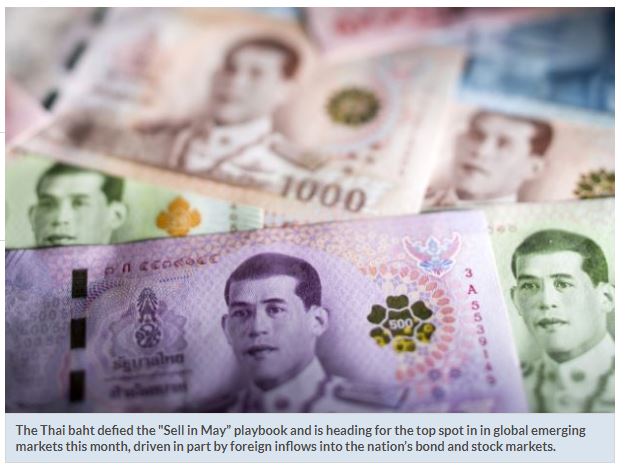Foreign inflows drive Thai baht to top emerging currency
BANGKOK: The Thai baht defied the “Sell in May” playbook and is heading for the top spot in in global emerging markets this month, driven in part by foreign inflows into the nation’s bond and stock markets.
The currency has gained 0.3% against the U.S. dollar in May as of 11:06 a.m. in Bangkok, making it the sole gainer among developing-nation currencies this month.
Net foreign inflows into stocks surged to the biggest in more than six years on Tuesday on speculation Thailand would win a larger weighting in the MSCI Emerging Markets index.
Overseas investors also turned net buyers of Thai debt this month for the first time since November.
The baht is reclaiming the top spot among emerging-market currencies after political gridlock post a March election and seasonal headwind of dividend outflows pushed the currency to give up being Asia’s best-performing currency in the first quarter in April.
Focus is shifting back to the country’s relative stability given the nation’s large current-account surplus and ample reserves as trade tension escalates, while a risk of being named a currency manipulator also fueled speculation of less intervention by the central bank.
‘Good Month’
“It was a good month for the baht with the political uncertainties that prevailed a while ago having eased and the re-balancing of the MSCI,” said Yasuhiro Nakamura, an emerging-market currency trader at Mizuho Bank Ltd. in Tokyo.
“There was also some speculation that the central bank may not be able to aggressively intervene to rein in baht gains, which also helped to boost the currency. Thailand’s fundamentals are quite steady.”
Foreigners bought net 12.5 billion baht ($393 million) of domestic equities Tuesday, the biggest daily inflow since 2012. International investors accounted for about 79% of total volume, according to stock exchange data. They also poured net $605 million into the nation’s debt market this month.
Overseas inflows are coming as MSCI Inc. had said that it will change the calculation of foreign ownership limits for Thai securities from the end of May 28. Morgan Stanley had estimated the change may lead to passive inflows of $2.4 billion and a 50 basis points increase in Thailand’s weight in the index.
The baht rose to its strongest level since February earlier this month, spurred by speculation the Bank of Thailand would be more tolerant of currency gains as the U.S. prepared its list of countries it judged as currency manipulators. Thailand wasn’t included in the report that was released on Tuesday.
And should the baht end the month up, it would only be the second time for it to score a winning month in May in the past decade.
“Foreigners bought Thai shares as a result of the MSCI calculation change,” said Soraphol Tulayasathien, senior executive vice president of the Stock Exchange of Thailand in Bangkok. “These inflows may be short term, but it still created a very good color for the market.” – Bloomberg
Source: https://www.thestar.com.my/business/business-news/2019/05/29/foreign-inflows-drive-thai-baht-to-top-emerging-currency/#44Ar9z6Es3cTfxl2.99


 English
English




